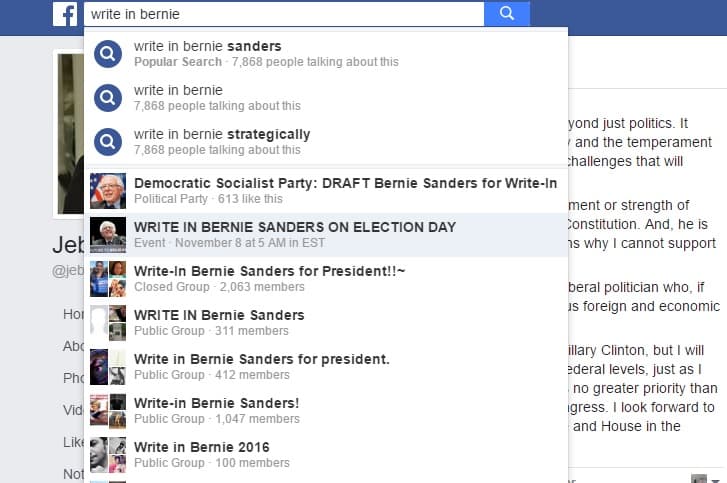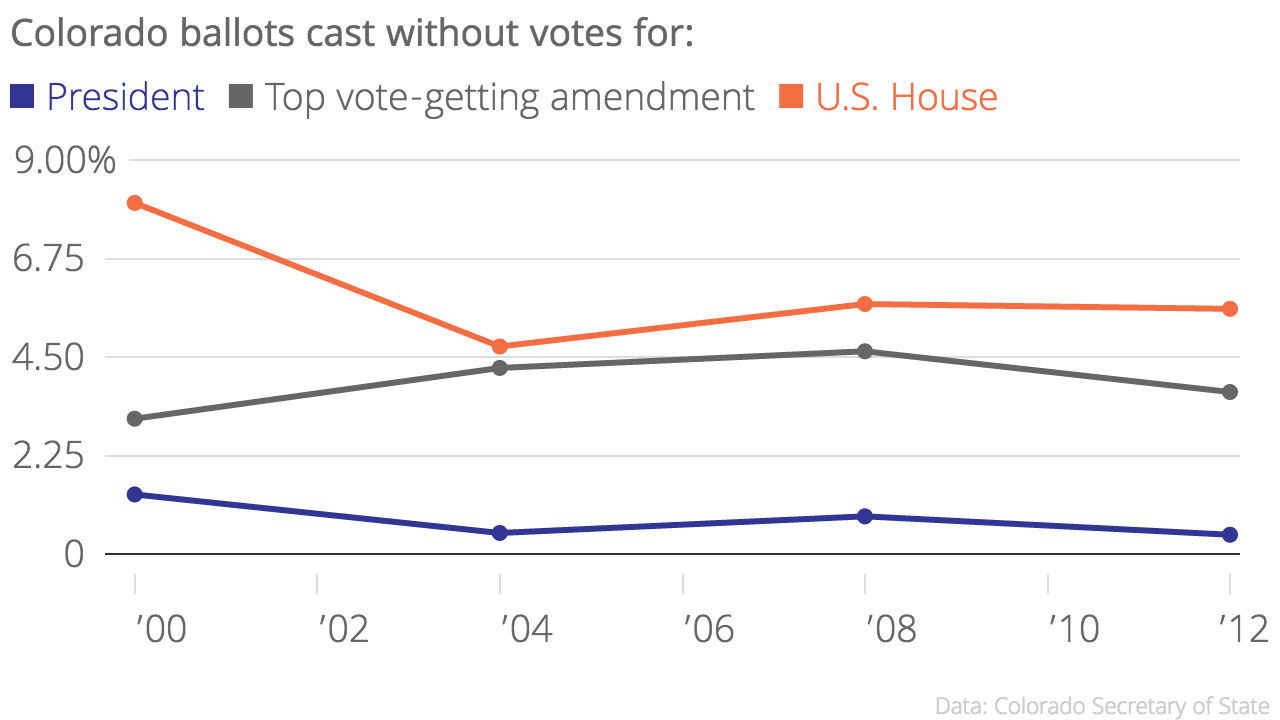
Rep. Mike Coffman might not vote for anybody for president, while presumably voting on many down-ballot items.
That would be a total role reversal/power move, considering it's much more likely for Coloradans to vote for a presidential candidate and not cast a vote for someone running for the House of Representatives.
Nearly everybody who casts a ballot votes for president.
According to data in the Secretary of State's election results archive, the highest percentage of Colorado ballots cast without a vote for a presidential candidate in the last five presidential election years was in 1996, when 2.6 percent of ballots cast did not include a vote for Bill Clinton or Robert Dole or Ross Perot (or Ralph Nader or Earl F. Dodge, etc.).

For comparison, that year 5.79 percent of ballots cast didn't include a vote for any candidate for the House of Representatives. And 6.24 percent of ballots didn't include a vote for or against the top vote-getting amendment, Amendment 11. Amendment 11 would have eliminated the property tax exemption for religious institutions, and it was defeated.
In the last three presidential cycles, fewer than 1 percent of all voters skipped the presidential race.
In 2012, with incumbent Barack Obama facing Mitt Romney and a whole slew of other challengers, all but 0.44 percent of ballots cast included a vote for a presidential candidate while 5.6 percent didn't bother voting for anybody for Congress.
This year is weird, though.
We know that both major candidates have high unfavorable ratings, and there are a couple of voter behaviors that could drive up the percentage of ballots with no presidential votes tallied in the 2016 election.
Anecdotally, I've heard people talk about not voting for anybody for president more this year than I've ever heard in the past. Typically if I hear or read anything like that, it's that the voter in question is considering either a protest vote or a conscience vote for a third-party candidate.

But this year, Gary Johnson and Jill Stein, the candidates representing the Libertarian and Green parties, have been especially unappetizing for the mainstream-type voters I know (or know of) who don't like the major party candidates. (That said, Johnson is polling at around 10 to 12 percent in Colorado, Stein's got her supporters and there are more than 20 tantalizing choices on the ballot in Colorado.) Evan McMullin, who visited Denver this week, is making the conservative play for this type of frustrated voter, but he's largely unknown outside of Utah.
Coffman's a pretty high-profile Coloradan to be considering the rare act of voting for a bunch of candidates, amendments and so on, but not a presidential candidate.
Nationally, it's hard to find people who have said definitively that they won't vote for any presidential candidate. Jeb Bush came close to saying he won't vote for anybody for president, writing on Facebook, "In November, I will not vote for Donald Trump or Hillary Clinton, but I will support principled conservatives at the state and federal levels."
Speaking of Bush, Rep. Ileana Ros-Lehtinen of Florida says she'll write in Jeb, which shows us another way the no-president ballot percentage could get a boost because that's not how voting in Florida works. She'll technically not be voting for anybody for president.
That's true in Colorado (and many other states), too. Write-in votes here won't count at all unless they're for one of six registered write-in candidates. Bernie Sanders isn't one of them. Mike Pence isn't one of them. Ted Cruz isn't one of them. Paul Ryan, John Kasich, Martin O'Malley (aw, remember?) -- not listed.

Let's look at two more years for a little more context.
It would be pretty amazing if there were any kind of significant number of people not voting for a presidential candidate while voting in down-ballot races. It just doesn't happen much, especially in recent elections.
In 2008, 0.86 percent of ballots cast didn't include a vote for president. Let's set our bar for this year with that number -- recent enough, polarized enough, an election with no incumbent.
That was the year that Obama and John McCain were at the top of the major tickets. Some 4.63 percent didn't vote for or against the most voted-on proposed amendment that year, Amendment 48, which would have changed the legal definition of a person to "any human being from the moment of fertilization." It was defeated. That year, 5.71 percent of returned ballots had no votes for candidates for the U.S. House of Representatives.
The year 2004 was the high point for percentage of ballots that included votes for candidates for the House, with only 4.74 percent leaving them out. That's pretty close to the 4.25 percent that didn't vote for or against Amendment 35, an easily passed tobacco tax increase.
The year nearly matches 2012 for percentage of votes for president -- only 0.48 percent of ballots didn't include a vote for Bush or John Kerry (or Ralph Nader or Earl F. Dodge, etc.).
OK, fine, who was Earl F. Dodge?
Earl F. Dodge ran for president six times representing the Prohibition Party. Originally from Massachusetts, he was a resident of Lakewood and died at Denver International Airport in 2007 during the run-up to what would have been his seventh presidential campaign. He was opposed to alcohol and abortions and was a trader of "campaign buttons and other political memorabilia."
He apparently made the familiar argument that voting for a candidate from one of the two major parties was simply choosing the lesser of two evils to the Denver Post in a 1978 interview. And again to the UPI in 1984, with this choice quote:
"They don't vote because they're really thrilled about the hero of 'Bedtime for Bonzo' or the peanut farmer. It's because they perceive one person is worse than the other."
In 2004 he got 140 Coloradans' votes for president of the United States, a decrease from the 208 he got in 2000. Both pale in comparison to the 8,183 votes he got while running for governor of Colorado in 1986 -- the fourth, and most successful, of five times he would seek the Centennial State's executive office.
Know anyone who won't be voting for a presidential candidate, but will be voting in other races?
Let us know: [email protected]. We'll be watching the results as they come in this year, of course.














